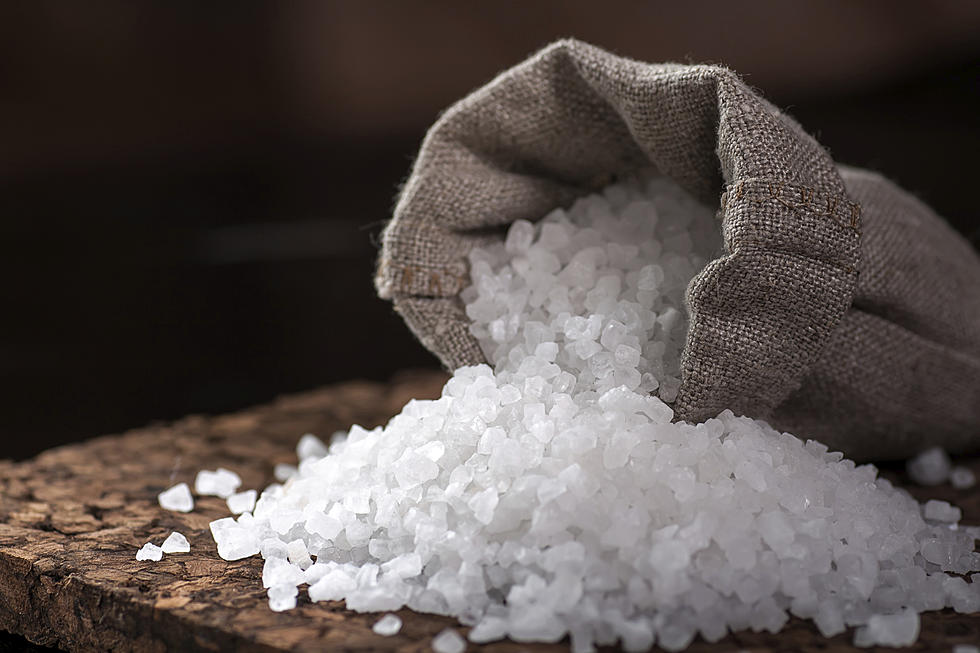
US Law Blocks Aid as Road Salt Runs Out in NJ
As winter ice puts lives at risk on New Jersey roads, Townsquare Media has learned that a 1920 federal maritime law stranded a shipment of road salt at a Maine seaport while urgent requests for a waiver were denied by the U.S. Department of Homeland Security.
Jim Simpson, head of New Jersey's Department of Transportation, would confirm only that the state's salt supply is dangerously low and may only last through two more snowfalls, with one expected Saturday. He also confirmed that federal officials were asked for help concerning a 94-year-old law preventing foreign vessels from moving cargo from one U.S. port to another. Meanwhile, New Jersey has been unable to transport 40,000 tons of available road salt in Searsport, Maine in time to meet the urgent need here.
Townsquare Media has learned federal help was actually refused, literally causing New Jersey's road salt shipment to miss the boat. A foreign transport sitting ready to load in Searsport is now approaching Port Newark empty, because the Department of Homeland Security denied the state's request for a waiver of the requirement for an American-flagged vessel.
Simpson alluded to the situation in an exclusive interview with Eric Scott, aired on New Jersey 101.5 Friday morning but said he was hopeful the federal government would help. But Townsquare Media has learned that the state's request to Homeland Security, which has granted such emergency waivers in the past, was turned down and New Jersey officials have spend the past week trying to get it reconsidered.
The law in question is the 1920 Maritime Act, also known as the Jones Act, a measure originally enacted to protect the American shipping industry from foreign competition. In 2012, Gov. Andrew Cuomo of New York was able to get Homeland Security to waive the requirement in order to facilitate petroleum shipments to the Northeast during the gasoline shortage.
In his interview on the Townsquare Radio Network Friday morning, Simpson said: "I've got a shipload of salt, 400 miles from here." He added: "The only thing that we've been able to define as an American flag vessel would take us a month to get the salt here when I can have the salt here in a day and a half."
Further details obtained by Townsquare paint an even stranger picture. The longer, slower solution described by Simpson for getting the road salt from Maine to Port Newark would involve two barges that would not only take at least three weeks to make the trip but would also be able to carry only 10,000 tons each, leaving half the shipment still stuck in Maine. Worse yet, while New Jersey waited unsuccessfully for a federal waiver, at least one available transport ship, under a Marshall Islands flag, was docked in Searsport ready to accept all 40,000 tons. Instead, the "bulk carrier", called the Anastasia S, is now en route to Port Newark empty.
David Matthau contributed to this report.
UPDATE: Thomas A. Allegretti, chairman of the American Maritime Partnership (AMP) released the following statement Friday afternoon after reading this report:
“America’s domestic maritime industry is responding to a last minute request for road salt to help the people of New Jersey. The industry is joining with other modes of transportation and road salt providers to ensure the state has the resources it needs amid widespread demand. New Jersey has filed a request for a Jones Act waiver for a foreign-flagged vessel and we are confident it will be considered fairly and appropriately in accordance with federal law.”
HEAR THE SIMPSON INTERVIEW:
“I’ve got a shipload of salt, 400 miles from here, with a ship sitting empty at the dock that can bring it to Newark and we’re working with the federal government because we don’t have an American flag vessel,” Simpson said. “And there’s this ‘Jones Act’ that’s about a hundred years old that says if you’re moving any products from the United State to the United States on the water, you have to have an American flag on the vessel. And the only thing that we’ve been able to define as an American flag vessel would take us a month to get the salt here when I can have the salt here in a day and a half.”
Discussions with federal officials may lead to “a favorable ruling” on the matter Friday, he said. “That’s the kind of stuff that we’re dealing with.”
Read More: Winter is $500M Hit to NJ Economy, Official Says | http://nj1015.com/winter-is-500m-hit-to-nj-economy-official-says/?trackback=tsmclip
“I’ve got a shipload of salt, 400 miles from here, with a ship sitting empty at the dock that can bring it to Newark and we’re working with the federal government because we don’t have an American flag vessel,” Simpson said. “And there’s this ‘Jones Act’ that’s about a hundred years old that says if you’re moving any products from the United State to the United States on the water, you have to have an American flag on the vessel. And the only thing that we’ve been able to define as an American flag vessel would take us a month to get the salt here when I can have the salt here in a day and a half.”
Discussions with federal officials may lead to “a favorable ruling” on the matter Friday, he said. “That’s the kind of stuff that we’re dealing with.”
Read More: Winter is $500M Hit to NJ Economy, Official Says | http://nj1015.com/winter-is-500m-hit-to-nj-economy-official-says/?trackback=tsmclip
More From New Jersey 101.5 FM









